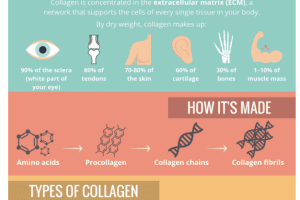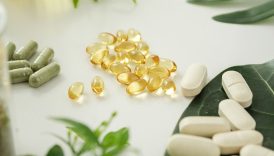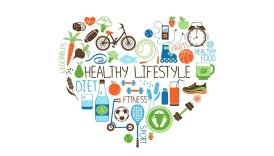The Science Behind Collagen and Its Benefits for Healthy Living

Introduction to Collagen
What is Collagen?
Collagen is often regarded as the “glue” that holds our bodies together. It’s the most abundant protein found in our bodies, making up a significant portion of our skin, bones, muscles, tendons, and ligaments. Think of collagen as the scaffolding that provides structural support, ensuring everything remains firm and cohesive. Collagen can be found in various forms, and understanding these variations helps us appreciate its diverse functions. Here are the key features of collagen:
- The Science Behind Collagen and Its Benefits for Healthy Living
- Introduction to Collagen
- What is Collagen?
- The Role of Collagen in the Body
- Types of Collagen
- Collagen Type I
- Collagen Type II
- Benefits of Collagen
- Improved Skin Health
- Joint Pain Relief
- Sources of Collagen
- Natural Food Sources
- Supplement Options
- Collagen Production in the Body
- Factors Affecting Collagen Production
- How to Boost Collagen Synthesis
- Collagen and Anti-aging
- Effects of Collagen on Wrinkles
- Collagen Supplements for Aging Skin
- Collagen for Hair and Nails
- Strengthening Hair with Collagen
- Nail Health Benefits
- Collagen and Gut Health
- Gut Lining Support
- Collagen for Digestive Health
- Athletic Performance and Collagen
- Muscle Recovery
- Joint Support for Active Individuals
- Collagen Supplements: Do They Work?
- Absorption Rate of Collagen Supplements
- Efficacy of Different Collagen Forms
- Protein Composition: Composed mainly of amino acids, particularly glycine, proline, and hydroxyproline.
- Fibrous Structure: Gives it the ability to withstand tension and provide strength.
- Types: There are over 16 types, but Types I, II, and III are the most prominent.
The Role of Collagen in the Body
Collagen plays a vital role in maintaining overall health. It impacts several functions, including:
- Skin Elasticity: Helps the skin maintain its firmness and hydration, contributing to a youthful appearance.
- Joint Health: Acts as a crucial component of cartilage, aiding in shock absorption and joint mobility.
- Bone Strength: Provides structure to bones, promoting resilience against fractures.
In everyday life, consider how often we rely on these functions. For instance, a hike may be fun, but if your joints aren’t supported, it could quickly turn unpleasant. Recognizing collagen’s significance highlights the importance of maintaining its levels in the body for optimal health and vitality.
Types of Collagen
Collagen Type I
Continuing our exploration of collagen, let’s dive into the different types, starting with Collagen Type I. This is the most abundant form, comprising about 90% of the collagen present in our bodies. It’s primarily found in the skin, tendons, organs, and bones. Think of it as the powerhouse that provides strength and structure. Here are some key points about Type I collagen:
- Skin Health: It plays a crucial role in the overall elasticity and firmness of the skin.
- Wound Healing: Supports the healing process by forming new tissue.
- Bone Density: Contributes significantly to bone strength and structure.
Many skincare products now tout collagen Type I due to its beauty benefits, leading many to explore its significance in their daily routines.
Collagen Type II
Next up is Collagen Type II, which serves a different, yet equally important role. This type is primarily found in cartilage, making it essential for joint health. Consider an athlete or someone who frequently engages in physical activities; they rely heavily on Type II collagen for smooth joint function. Here’s what to know about this variety:
- Joint Support: Provides cushioning and support for joints, reducing the risk of injury.
- Maintain Flexibility: Promotes the overall smooth movement of joints during activity.
Understanding the distinctions between these types can help individuals choose appropriate supplements or dietary options, especially if they aim to boost skin health or enhance joint functionality.
Benefits of Collagen
Improved Skin Health
Now that we understand the different types of collagen, let’s look into some impressive benefits, starting with improved skin health. Many people are turning to collagen for its beauty benefits, and it’s easy to see why. As we age, our natural collagen production declines, often resulting in dull, sagging skin. By integrating collagen into your routine, you could experience:
- Enhanced Elasticity: Collagen helps maintain skin firmness, making it appear more plump and youthful.
- Reduction in Wrinkles: Regular supplementation may soften the appearance of fine lines.
- Increased Hydration: Promotes moisture retention, allowing the skin to stay hydrated.
I remember trying collagen supplements for the first time after noticing dryness around my eyes; the improvement was noticeable within weeks!
Joint Pain Relief
In addition to its skin-enhancing properties, collagen can also provide significant joint pain relief. As we age or engage in strenuous activities, our cartilage can wear down, leading to discomfort. Collagen Type II is particularly beneficial in this regard. Here’s how it works:
- Cartilage Support: Helps to rebuild and preserve cartilage, leading to reduced friction in joints.
- Improved Mobility: Those who take collagen supplements often report greater ease in moving and performing daily activities.
- Reduced Pain: Many studies indicate that collagen can alleviate pain in individuals with joint disorders.
For anyone with an active lifestyle or those experiencing chronic joint pain, incorporating collagen could be a game changer for comfort and mobility.
Sources of Collagen
Natural Food Sources
As we continue to unveil the wonders of collagen, it’s important to identify the sources from which we can obtain this essential protein. Natural food sources play a critical role in boosting our collagen levels. Including these foods in your diet can help replenish collagen naturally:
- Bone Broth: This is a powerhouse source. Slow-cooked bones release collagen directly into the broth.
- Fish and Shellfish: Rich in collagen, especially in the skin and scales.
- Eggs: Particularly the whites, are loaded with proline, an amino acid crucial for collagen production.
- Leafy Greens: Vegetables like spinach and kale provide vitamins and minerals that support collagen synthesis.
I often whip up a batch of homemade bone broth; it’s not only delicious but a fantastic way to boost collagen intake!
Supplement Options
If you’re looking for a more concentrated dose of collagen, supplements are another viable option. They come in various forms, making it easy to integrate into any routine. Some popular types include:
- Collagen Peptides: These are hydrolyzed collagen, making them easily digestible and absorbable.
- Gelatin: A cooked form of collagen, often used in cooking and baking.
- Collagen Powders: Can be mixed into smoothies or soups for a convenient collagen boost.
Choosing a high-quality supplement can be pivotal. As with all supplements, it’s beneficial to read labels and consult with a healthcare provider, especially if you have specific health concerns. This way, you can effectively support your collagen levels and enhance your overall well-being!
Collagen Production in the Body
Factors Affecting Collagen Production
Understanding how our bodies produce collagen is essential if we want to maintain its levels effectively. Unfortunately, several factors can negatively impact this production. Here are the main culprits:
- Age: As we age, collagen production naturally declines, leading to noticeable signs of aging.
- Diet: A poor diet lacking in vital nutrients can hinder collagen synthesis.
- Sun Exposure: UV rays can break down collagen, leading to skin damage and premature aging.
- Smoking: Tobacco products can reduce collagen levels and impair blood flow to the skin.
I once noticed a decline in my skin’s elasticity due to excessive sun exposure; it served as a reminder of how these factors influence collagen levels.
How to Boost Collagen Synthesis
Fortunately, there are effective ways to encourage your body to produce more collagen. Here’s how:
- Nourish with Nutrition: Incorporate foods rich in vitamin C, amino acids, and zinc, such as citrus fruits, nuts, and leafy greens.
- Stay Hydrated: Water aids in maintaining skin elasticity and overall health.
- Limit Sugar Intake: High sugar levels can interfere with collagen, so moderating sweets can help.
- Consider Supplements: Collagen peptides or powders can provide the body with the necessary building blocks to enhance production.
Implementing these strategies may greatly benefit skin health, joint function, and overall wellness, promoting a more youthful appearance and vitality!
Collagen and Anti-aging
Effects of Collagen on Wrinkles
The connection between collagen and anti-aging is a hot topic, especially when it comes to those unwelcome wrinkles! As we age, collagen levels deplete, often leading to sagging skin and fine lines. Here’s how collagen directly affects wrinkles:
- Skin Elasticity: Collagen contributes to skin firmness, and as it diminishes, the skin loses its bounce and starts to sag.
- Hydration Levels: Adequate collagen helps retain moisture, which is crucial for a smooth complexion.
- Reduced Fine Lines: Regular collagen replenishment may minimize their appearance by promoting skin regeneration.
I started noticing fine lines in my late twenties, prompting me to take a closer look at my skincare routine. The difference it made was remarkable after integrating collagen!
Collagen Supplements for Aging Skin
When it comes to combatting the signs of aging, collagen supplements have become increasingly popular. So, what makes them effective for aging skin?
- Fast Absorption: Many supplements, especially collagen peptides, are easily absorbed into the bloodstream, delivering essential amino acids right where they are needed.
- Clinically Proven Benefits: Research shows that collagen supplements can improve skin hydration, elasticity, and overall texture.
- Convenient Options: Available as powders, capsules, and drinks, they can seamlessly fit into any lifestyle.
In my experience, taking collagen supplements has significantly enhanced my skin’s texture and radiance, proving to be a worthy addition to my anti-aging arsenal!
Collagen for Hair and Nails
Strengthening Hair with Collagen
As we transition from skin care, let’s discuss how collagen plays a significant role in our hair health. Many people overlook this vital connection, yet collagen can be a game-changer for anyone looking to strengthen their locks. Here’s how collagen can benefit your hair:
- Improved Elasticity: Collagen helps hair fibers remain strong and elastic, reducing breakage.
- Moisture Retention: It aids in retaining moisture, keeping hair well-hydrated and vibrant.
- Promotes Growth: The amino acids in collagen may stimulate hair follicles, leading to healthier hair growth.
After incorporating collagen supplements into my routine, I noticed my hair felt stronger and shinier, encouraging me to experiment with new styles without the fear of damaging it.
Nail Health Benefits
Collagen doesn’t stop at hair; it’s equally beneficial for nail health! Weak, brittle nails can be frustrating, but here’s what collagen can do to help:
- Increased Strength: Regular collagen intake can fortify nails, making them less prone to chipping and breaking.
- Improved Growth Rate: Many users report faster nail growth after adding collagen to their diet.
- Hydration: Just like skin and hair, collagen aids in nail hydration, promoting a healthy sheen.
Trying collagen for my nails was one of the best decisions I made—my nails not only grew faster but were also much stronger, allowing me to embrace my love for nail art with confidence!
Collagen and Gut Health
Gut Lining Support
Shifting gears, let’s delve into the fascinating relationship between collagen and gut health. Many people are surprised to learn that collagen can play a pivotal role in supporting the gut lining. The gut lining is crucial for overall digestive function and absorption of nutrients. Here’s how collagen contributes:
- Strengthens Gut Barrier: Collagen helps repair and maintain the gut lining, reducing the risk of leaky gut syndrome.
- Amino Acids for Healing: The amino acids in collagen, such as glycine and glutamine, are essential for rebuilding and maintaining a healthy gut lining.
One thing I noticed after integrating collagen into my diet was improved digestion. I felt less bloated and more comfortable after meals.
Collagen for Digestive Health
In addition to supporting the gut lining, collagen can further enhance overall digestive health. Here are a few benefits:
- Promotes Proper Digestion: Collagen can assist in food breakdown and absorption, making digestion smoother.
- Soothes Inflammation: Its anti-inflammatory properties help alleviate gastrointestinal discomfort.
- Improves Nutrient Absorption: By maintaining a healthy gut, collagen allows our bodies to absorb nutrients more effectively.
I recently read that combining collagen with a diet rich in fiber has been beneficial for many. After trying this approach, I’ve experienced a noticeable boost in my digestive comfort and overall well-being!
Athletic Performance and Collagen
Muscle Recovery
Transitioning from gut health, let’s explore how collagen can enhance athletic performance, particularly in muscle recovery. For anyone who exercises regularly, recovery time can greatly affect overall performance and motivation. Here’s how collagen plays a role:
- Reduces Muscle Soreness: Collagen supports muscle repair and can reduce the severity of post-workout soreness.
- Aids in Tissue Repair: It provides the amino acids needed to rebuild muscle fibers, allowing for quicker recovery after intense workouts.
- Improvement in Endurance: By enhancing recovery, athletes can train more effectively and improve overall performance.
I remember the days when I’d push through soreness without much help. Since incorporating collagen into my post-workout routine, I’ve noticed I feel fit and ready to tackle the next session much faster!
Joint Support for Active Individuals
Alongside muscle recovery, collagen is essential for joint support, particularly for those who lead an active lifestyle. Here’s how it can help:
- Cushions Joints: Collagen helps maintain cartilage integrity, acting as a cushion during high-impact activities.
- Reduces Risk of Injury: By providing structural support to joints, collagen can minimize the chances of common injuries.
- Enhances Flexibility: Improved joint health contributes to better range of motion, making activities more comfortable.
Personal anecdote: After a few years of jogging, I felt some discomfort in my knees. Since adding collagen to my daily routine, I’ve experienced much more stability and comfort while running. It’s made a world of difference in my athletic pursuits!
Collagen Supplements: Do They Work?
Absorption Rate of Collagen Supplements
As we reflect on the benefits of collagen, you might wonder, do collagen supplements actually work? A key factor in their effectiveness is how well they are absorbed by the body. Research indicates that:
- Hydrolyzed Collagen: This form is broken down into smaller peptides, making it easier for the body to absorb effectively.
- Rapid Absorption: Studies suggest that these peptides can be absorbed within an hour and may start providing benefits shortly after.
In my own experience, I noticed a difference in my skin texture within weeks of starting collagen peptides. It’s reassuring to know that they’re quickly making their way into my system!
Efficacy of Different Collagen Forms
When it comes to the various types of collagen supplements available, not all are created equal. Here’s a quick comparison of the most popular forms:
- Collagen Peptides: Easily digestible and versatile for shakes or hot drinks, known for rapid absorption and benefits.
- Gelatin: Best for culinary uses; while it has health benefits, it’s less readily absorbed than hydrolyzed forms.
- Collagen Creams: Topical applications can hydrate and may improve skin appearance, but they don’t replace the internal benefits of ingested collagen.
Overall, I’ve found collagen peptides to be the most effective choice for my routine, and I appreciate their convenience and quick results!





